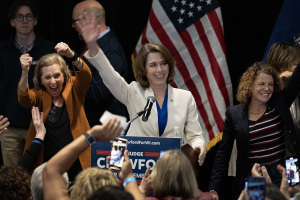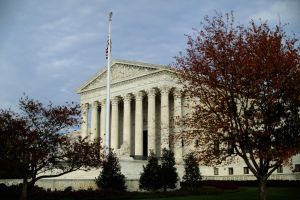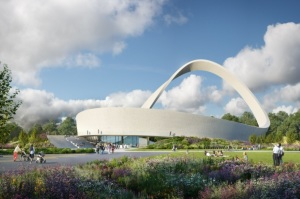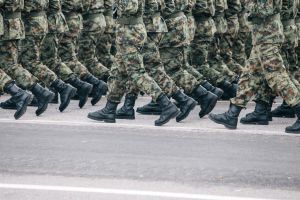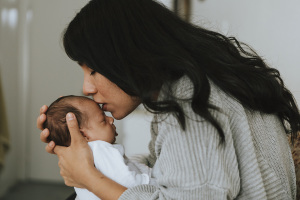'The Grandmother Locked in the Bedroom:' A Native American Perspective on History, Immigration, and Thanksgiving
Among the millions of families celebrating Thanksgiving this week are many Native Americans who see it as a time to come together and give thanks, but some are reminding their fellow citizens that there is very little understanding of indigenous peoples' history in the U.S., and that the path to reconciliation is still a long one to walk.
"It feels like our Native community is an old grandmother, who has a very large and very beautiful house. And years ago, some people came into our house, and locked us upstairs in the bedroom. Today, our house is full of people. They are sitting on our furniture, they are eating our food, they are having a party in our house. They've even come upstairs and unlocked the door to our bedroom, but it's much later, and we're tired, we're old, we're weak, we're sick, and so we can't, or we don't come out," reflects Mark Charles, a speaker and writer located on the Navajo Reservation in Fort Defiance, Ariz., in a video posted earlier this year titled "Being Native American in the US."
"But the thing that is most painful, is that virtually no one comes upstairs to find the grandmother in the bedroom. Nobody sits down next to us on the bed, and simply says: 'Thank you. Thank you, for letting us be in your house.'"
While some commentaries on Native Americans and Thanksgiving, such as a 2010 article by News Junkie, describe the holiday as "celebrating the genocide of Native Americans" and recall the long and bloody war history between colonialists and indigenous people, Charles shared in a phone interview with The Christian Post on Tuesday that he and his family celebrate Thanksgiving much like most other American families.
"It's a holiday that I see many Native Americans participating in and using it as a time to gather family and friends and remember to be thankful. But I also agree that there is a large part of our history as a nation that often gets ignored," he began, and noted that many people have heard or been told some version of the myth of the first Thanksgiving, of how a meal was supposedly shared between native tribes and some of the first pilgrims.
Charles, the son of an American woman of Dutch heritage and a Navajo man, is deeply involved in both Native American and Christian issues – he has worked on various projects with the Calvin Institute of Christian Worship, the Christian Reformed World Missions, Sojourners, Emerging Voices Project, InterVarsity Christian Fellowship and Campus Crusade; and he is a board member on the Christian Community Development Association and the Christian Reformed Church of North America.
He told CP that Thanksgiving is one of the few holidays that provides people an opportunity to gain a little bit of awareness of the indigenous population, which today numbers over 5 million the U.S., but there is still very little understanding of the history of systemic injustices that have occurred.
As for the metaphor of the grandmother in the bedroom, Charles said that it has been a very successful tool and a starting point of conversation in many of his speaking engagements, both in native communities and non-native settings.
"I think it's very important for Native Americans – often we feel like guests in someone else's house, when the reality is we are the host people of this land. The starting point that I'm looking for is for Native communities to see themselves in the role of the hosts of this land, and the rest of the nation to understand in real practical and tangible ways that they are guests in someone else's house," he explained.
Charles has written and spoken on a number of U.S. policy issues – including immigration reform. He says that any dialogue on the issue has to begin with the Native American community, who have a different perspective and different voice to add in regards to living in the U.S.
"Our nation is incapable of comprehensively and justly reforming immigration law, because (looking back at history) you see that everyone was undocumented. This was not an empty land when Christopher Columbus got lost at sea. He did not land on an empty continent, he landed on a continent that was inhabited by millions of people."
Several of the blog posts on his website reflect his thoughts on the need for reconciliation and the search for justice, including a heartfelt "prayer for indigenous peoples," which highlights his frustration with the extent to which Native American voices have been ignored in the conversation of bi-partisan immigration reform.
"Father, I am not asking you to judge our nation, nor am I seeking your vengeance upon our guests. Instead, I am pleading for your healing," the prayer asks. "Heal my people. Heal our guests. Heal our land."
Charles has also publicly spoken about an "apology" offered by the U.S. government to Native Americans, buried in a 67-page 2010 Department of Defense appropriations bill (H.R. 3326), which reads:
"The United States, acting through Congress – apologizes on behalf of the people of the United States to all Native Peoples for the many instances of violence, maltreatment, and neglect inflicted on Native Peoples by citizens of the United States, expresses its regret for the ramifications of former wrongs and its commitment to build on the positive relationships of the past and present to move toward a brighter future – urges the President to acknowledge the wrongs of the United States against Indian tribes in the history of the United States in order to bring healing to this land."
The Navajo speaker and writer said that although he appreciates sincere efforts to try and get something on the record, he felt that the apology was not a good apology, because it was watered down, and included no reference to any specific tribe, or treaty, or act of injustice.
He also reflected on the role of the church when it comes to bringing healing and reconciliation to America, noting that for centuries, the church acted as an arm of the government, setting up boarding schools and enforcing assimilation, which included taking Native children from their homes and putting them into boarding schools.
"On the other hand, the church is an incredible place, if it listens to the teachings of Jesus and follows his model, there are many ways the church can lead toward a reconciliation. Especially if you look at the teachings as regard to worship," Charles continued, and pointed to the book of Matthew, where Jesus tells his disciple to leave his gift at the altar and first go to be reconciled with his brother.
"The church needs to come back to a more pure form of understanding as to what worship is, and what God's heart for worship is, that the church will be able to lead more clearly into those issues of both the systematic injustice and lack of reconciliation."
He concluded that because his mother is American of Dutch heritage, and his father is Navajo, he feels deeply called and committed to a ministry of reconciliation.
"I am doing everything I can to initiate this conversation. Both in the local church, and on a national level – to try and find a space where the two parties can come together and initiate a dialogue."
Currently Charles is in the middle of an ongoing discipleship project, and next week he will be hosting five pastors from different countries at the Navajo reservation.

















